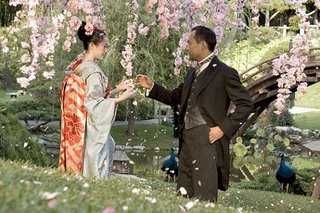
Memoirs of a Geisha is a beautiful movie featuring some of the best cinematography to come along in quite some time. Only a skilled director can properly complement the scenery and not overwhelm or underutilize it; Rob Marshall, fresh from his success with Chicago, is the perfect fit. The characters find themselves in scenes looking just like a brilliant, once-in-a-lifetime moment was just captured by happenstance. There’s an ease to it all that lends to the beauty of this film. It’s a movie with grace and dignity.
Ziyi Zhang plays Sayuri, a young woman that has been sold by her ailing and poverty stricken parents into the world of the Geisha and separated from the only family she has left, her sister Nobu. Sayuri is distracted and frightened and unable to put everything aside long enough to fit into this new world and soon finds herself relegated to a servant, not allowed to continue her Geisha training.
A word of caution: Some of this talented cast speaks English that is less than polished. If you don’t pay attention there will be dialogue from Zhang and others that seems unintelligible.
But then, in a “kindness of strangers” sort of moment, along comes Ken Watanabe playing the Chairman. He shows young Sayuri kindness and sympathy and makes her understand that the world isn’t only a cruel place. Sayuri has an epiphany and realizes that playing along in the cold, often cruel world of the Geisha can be a means to an end; being successful in the role of the Geisha can mean entry into another world—a world of rich men and fancy parties, a place where she can be at someone’s side rather than under their thumb.
The movie gives a look at a fascinating culture where kindness and honor seem to reside harmoniously with cruelty and greed. Young, pretty Geisha sabotage and ridicule new comers to the world, old women purchase young girls like a commodity and make them work of this “debt” until they’re profitable—Geisha quickly learn that love, marriage and family are forbidden in this new world of theirs. And yet, there’s the Chairman and his unwavering kindness, a tutor in the Geisha house that takes Sayuri under her wing, pities her and takes a real joy in her successes.
Watching the films characters move from one heartbreaking situation to another kept me wondering when they would just break, give up—give themselves over to cruel actions and a world view that no longer allowed for compassion. When would they begin to feel like the world had tossed them into the trash and give up their dreams of freedom and happiness. It’s the best kind of story about the human spirit because it’s believable—there’s nothing superhuman in Sayuri’s endurance of the world, just remarkable.
Ken Watanabe, most recently from Batman Begins, The Last Samurai and the upcoming Clint Eastwood epic Flags Of Our Fathers, is fantastic as the Chairman; Ziyi Zhang and Watanabe turn in absolutely stellar performances here. Zhang shows us an innocent, wide-eyed character that, unlike the stereotype, never completely has it beaten out of her. The way Zhang plays it, the innocence and keeping a positive outlook in her fellow man becomes hard, it has to be forced, but she fights to hang onto it to whatever extent she can. She wants to think the best of people, she wants to think that fate will deliver her where she deserves to be, she wants to retain a little naiveté…and she does, though it no longer comes naturally.
It’s hard to say enough about the cinematography featured in this movie. It was absolutely gorgeous and yet so subtle that it never took over the shot. Simply amazing. There’s a moment where Zhang is standing, in full Geisha dress, under a blossoming plum tree and she looks so perfect there. It would be so easy for that scene to look staged an unnatural; instead it looks like Zhang has briefly recaptured her youth and innocence and nature itself is in agreement with her, showering her with tender pink flowers while the man she secretly loves looks on. It’s a great moment in it’s subtlety and in those 30 seconds the scene, and Zhangs wonderful acting, manage to convey so much character information it’s astounding.
It is now obvious to me that this film, Cinderella Man and Walk The Line were all better, far better, than Crash, the eventual Oscar Winner.
The Academy is now as irrelevant and impotent as the UN. No movie lover can see all of these films and come to any conclusion other than: Political Correctness won the day and three brilliant movies were ripped off.
Memoirs of a Geisha was one of the best films I saw last year, clearly a top five entry. If you haven’t seen it, please do.
No comments:
Post a Comment